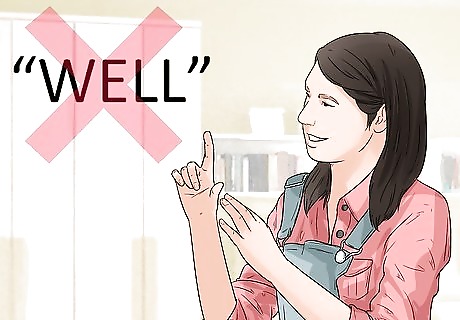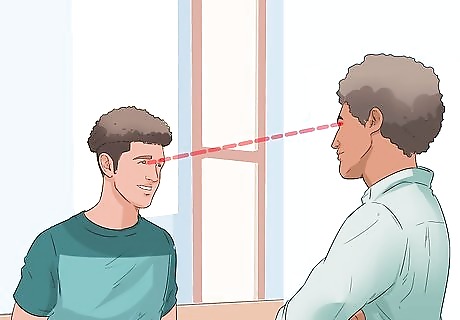
views
Proving Your Innocence Using Language

Admit to a lesser charge. People who flat out deny their involvement in wrong-doing are less likely to be believed than people who cop to committing a lesser offense. Admitting you did something wrong, even if it’s not the wrong thing you were accused of, may help convince your parents of your innocence. So if you did it, be honest. It'll get them to trust you more. If you stand accused of skipping school, explain that you didn’t skip school, but you did give someone a ride home when you know you weren’t supposed to. If you’re accused of throwing a party when your parents are out of town, explain that you didn’t have a party, but you did invite a few close friends over to hang out.

Practice telling your story backwards. One trick investigators use when trying to separate the innocent from the guilty is to have the suspect tell their story backwards. Most suspects practice their story in chronological order, so being able to confidently tell your story out of order will make you appear more truthful. Even if you’re telling the truth, repeating your story out of order will be difficult. Don’t be too rehearsed about it or your parents will know you’re lying. Rehearse your gestures as well as your words. If your gestures look forced, that’s a clear indicator that you’re not being forthcoming.

Avoid using the word “Well.” Well is a placeholder word that liars frequently employ when they’re trying to buy more time to think of their lie. Avoid using placeholder words like “Well” or “So” or “Look” and instead focus on giving clear and concise yes or no answers to questions. Don’t give yes or no answers to longer questions or it will look like you’re avoiding answering the question. For questions requiring longer answers, be concise and keep your answer focused and courteous.

Keep your story short. The more details and information you include in your story, the more it seems like you’re lying and trying to cover up the truth. To tell a believable lie, keep your story short and deliver it confidently. The longer your story is, the easier it is to get tripped up by details. The best lies are the ones that are rooted in truth. Include as much truth as you can and fudge only on the details that will get you in trouble.

Avoid proclaiming your honesty. If you truly want your parents to think you’re innocent, don’t keep telling them that you are. Repeatedly stating that you’re not guilty only makes you look more dishonest. Honest people don’t use lines like, “Would I lie to you?” so you shouldn’t either. The more defensive you get, the more dishonest you seem.
Using Facial and Body Language to Establish Trust

Make eye contact. Making eye contact with your parents is incredibly important; eye contact establishes trust and makes you look alert and interested in the conversation. By not making eye-contact, you are essentially proving that you are guilty of the crime. Hold the eye contact, even when you feel uncomfortable. Looking away or avoiding eye contact will make you look guilty.

Move around. Standing completely still suggests a deer in headlights and may further convince your parents that you’re guilty. Move around, but do so naturally – if you don’t usually gesture with your hands when you talk, don’t start using excessive hand gestures now. Don’t cross your arms over your chest. This makes you look closed off and threatening, but not trustworthy. Don’t touch or cover your mouth. This implies that you don’t know what to say. Don’t fidget. Fidgeting only makes you look guilty and anxious.

Smile with your eyes. Facial cues are an easy way to detect if someone is being dishonest and a fake smile usually points to a guilty person. When smiling, concentrate on smiling with your whole face. Crinkle your eyes when smiling. This makes your smile look more genuine. Don’t smirk. Smirking usually suggests that someone is being disingenuous.
Proving Your Innocence If You’re Actually Innocent

Establish an alibi. If you are actually innocent of the crime you’re being accused of, the best way to prove your innocence is to establish an alibi. If you were with someone else at the time the crime was being committed, they can vouch for your innocence. If you stand accused of cheating on a test and you know you were actually at the nurse when the test was occurring, have the nurse call your parents and explain. If someone else knows who committed the crime, convince that person to come forward and exonerate you.

Establish your lack of motivation. When most people commit crimes, they have a motive or reason for doing so. Proving that you had no reason to want to commit this offense is a useful way to prove your innocence. If you’re accused of stealing money from your parent’s wallet, point to all the money you just made baby-sitting as a reason why you wouldn’t need to steal. If you know that your brother really wants a new video game, but he doesn’t have the money, point to that as a possible motivation for committing the crime. If you know someone else has a clearer motivation for committing the crime, suggest them as a possible suspect.

Catch the culprit. The only real way to exonerate yourself fully is to catch the person who actually committed the crime. Depending on the crime and person who committed it, this may be impossible to do, but you owe it to yourself to try. Set up a trap to catch the criminal. If you’re accused of stealing food from the pantry, set up a hidden video camera above the pantry to see if you can catch the person in the act. If you think you know who did it, stage a conversation with that person and try to trick them into confessing. Record them on your smart phone and use the recording to prove your innocence. Remind your parents that under American law, you are innocent until proven guilty.

















Comments
0 comment